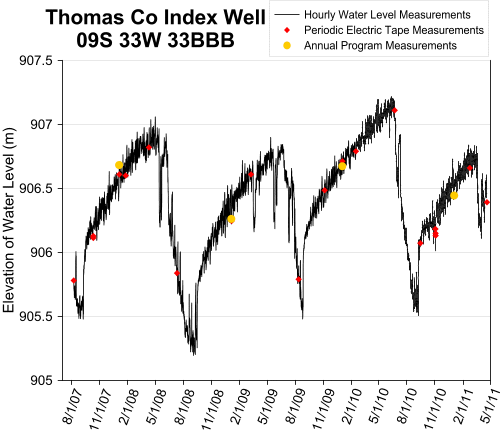INTERPRETATION OF WATER-LEVEL CHANGES IN WELLS: Signal or Noise?
Hydrographs from continuously monitored wells can provide important information for a wide range of hydrogeologic investigations. The big question, however, is how to extract the information of relevance for your investigation. Ask yourself how you would interpret the data below:

If you work on groundwater-related projects, you can appreciate the importance of not only identifying and differentiating water level noise from the clean data signal, but, more importantly, how to cope with it so it does not lead to erroneous results that can be a technical mistake or, worse yet, a project team embarrassment.
In this 90-minute webinar, participants will learn
- The mechanisms that can affect hydrographs and the impacts that monitoring equipment can have on water-level records;
- How to assess the hydrostratigraphic setting from water-level responses to changes in barometric pressure;
- Simple to perform analysis procedures to remove the impact of barometric-pressure changes from water-level data;
- How to apply pumping-test analysis methods to hydrograph records to get insights into the major hydrostratigraphic controls on the system under investigation.
This webinar is taught by Jim Butler who will provide participants with information that is not available elsewhere on the web. Jim's work on hydrogeologic field methods is widely recognized by the academic, consulting, and regulatory communities.
Here's what people are saying about Jim's past webinar:
"A very well executed online training session that enabled us to analyse existing pressure transducer data from a new perspective, gaining new knowledge about our wells and aquifers using data already collected. New concepts were quickly and easily understood thanks to the presentation and delivery of the speaker. Highly recommended for anyone working in groundwater monitoring programs."
-Graeme Henderson, Groundwater Technician, British Columbia Public Service
"By using real-world slug test data during the webinar, I was able to see right away how Jim Butler's guidelines improve the efficiency and confidence in hydraulic conductivity test results. The presentation's clear graphics and on-site examples made this a practical learning experience, and I will certainly be able to implement these ideas both in the field and in analysis".
-Rachel McLean, AMEC Earth & Environmental
Instructor Bio
Jim Butler, Ph.D.
 Jim Butler is the author of "The Design, Performance, and Analysis of Slug Tests" (Second Edition). He currently is a Senior Scientist in the Geohydrology Section of the Kansas Geological Survey at the University of Kansas, where he has worked for over 30 years.
Jim Butler is the author of "The Design, Performance, and Analysis of Slug Tests" (Second Edition). He currently is a Senior Scientist in the Geohydrology Section of the Kansas Geological Survey at the University of Kansas, where he has worked for over 30 years.
His research interests include aquifer testing, assessment of aquifers that support irrigated agriculture, high-resolution subsurface characterization, well responses to natural and anthropogenic stimuli, and the role of phreatophytes in stream-aquifer systems.
Jim holds a B.S. in Geology from the College of William and Mary, and a M.S. and Ph.D. in Applied Hydrogeology from Stanford University. Jim was the 2007 Darcy Distinguished Lecturer of the National Ground Water Association (NGWA), the 2009 Pioneers in Groundwater Award honoree by the American Society of Civil Engineers - Environmental and Water Resources Institute, and, most recently, the 2020 recipient of NGWA's M. King Hubbert Award.
Jim helps advance the environmental and engineering industry through teaching professionals about both slug testing and pumping tests. Jim has taught more than 40 courses with Midwest GeoSciences Group. This webinar is another step toward that advancement and we are grateful to have Jim Butler teach this purposeful and applied webinar.
| Fee: |
299.00 USD Per Webinar
|
| Materials and Downloads: |
Session Slides (PDF)
Additional MaterialsRecord of Attendance Form (PDF)
|
Number of
Participants: |
AS OF JUNE 1, 2020, WEBINARS ARE PRICED FOR INDIVIDUALS WORKING ALONE. Pricing is discounted for individual registrations for people working alone.
|
Continuing
Education
Certificates: |
$14.95 each. Official CEU certificates are available as an option. After successful completion of this webinar, a link will be provided to order a certificate.
|
| Access: |
On-demand, anytime 24/7. |
| Discounts: |
Buy 3 on-demand webinars, and get 3 on-demand webinars for free!
|
| Duration: |
90 minutes |
| PDH Earned: |
1.5 hours |
| |
|
| Instructor(s): |
Jim Butler, Ph.D.
Section Chief at the Kansas Geological Survey
and author of The Design, Performance, and Analysis of Slug Tests |